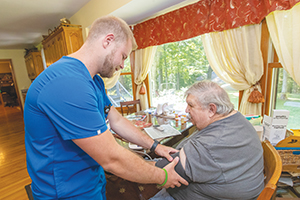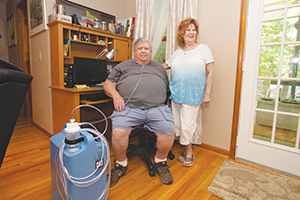By LISA EISENHAUER
When the doctor overseeing his care at Ascension Saint Thomas Hospital Midtown in Nashville gave Clinton Hammock the option of finishing his treatment for his cardiac condition at home, Hammock said yes.

Jarrod Lowery, a registered nurse with Contessa Health, checks the blood pressure of Clinton Hammock. Rather than continue his cardiac care as an inpatient at Ascension Saint Thomas Hospital Midtown in Nashville, Hammock opted to get hospital-level care at his home in the small town of Pegram, Tennessee.
Frederick Breedon/© CHA
The 74-year-old had been admitted to the hospital in early June, after a lingering respiratory infection led to a persistent cough and fluid buildup around his heart. Two days later, he was home in Pegram, Tennessee, about 20 miles west of Nashville.
Hammock was sent home with a remote patient monitoring kit that included a scale, thermometer, pulse oximeter, blood pressure monitor, stethoscope, and a tablet for virtual doctors' visits. Nurses monitored his vitals and he was able to see his doctor through a virtual connection every day. He was released from care in early July.
Hammock said he thinks getting his medical care at home where he could sleep in his own bed and have his family nearby sped his recovery. "It was all real nice," said the retiree who likes to fish and tinker with old cars.
The hospital-level treatment that Hammock got in the comfort of his home came courtesy of the hospital and its partnership with Contessa Health, a provider of acute home care services. The care model aligns with a growing movement to provide some forms of acute care outside hospitals or nursing facilities.
CMS backing
The trend has been propelled in recent months by the Centers for Medicare & Medicaid Services. In November, CMS announced its Acute Hospital Care at Home program to give hospitals "unprecedented regulatory flexibilities to treat eligible patients in their homes."

After two days in the hospital, Clinton Hammock opted to finish his acute treatment for a respiratory and cardiac condition at home through Ascension Saint Thomas Hospital Midtown in Nashville, Tennessee. Hammock says being home with his wife, Vicki Hammock, with other loved ones able to visit, he rested more comfortably and recovered more quickly.
Frederick Breedon/© CHA
"The program clearly differentiates the delivery of acute hospital care at home from more traditional home health services," the CMS announcement said. "While home health care provides important skilled nursing and other skilled care services, Acute Hospital Care at Home is for beneficiaries who require acute inpatient admission to a hospital and who require at least daily rounding by a physician and a medical team monitoring their care needs on an ongoing basis."
Ascension Saint Thomas was an early provider of hospital-at-home care through its joint venture with Contessa. Dr. Greg James, chief medical officer for Ascension Saint Thomas, said that partnership, which started in summer 2019, grew out of an Ascension initiative called Mission-Inspired Transformation.
"The Mission-Inspired Transformation work was really all about trying to meet consumers and patients where they are in their health care journey, and how can we explore new care models," James said.
James said that working with Contessa accelerated the setup of the program. "They had great models for how this had been done in other places," he said.
The prep work to set up the program took several months. The first patient was admitted in November 2019.
Patient needs, abilities considered
Dr. Mark Montoney, senior medical adviser for Contessa, said the company operates in seven U.S. markets. In Arizona, it partners with two hospitals that are part of CommonSpirit Health.
Montoney said patients eligible for acute care under its partnerships meet criteria for hospital admission but are at the lower end of the scale in terms of acuity, "meaning that they're slightly less sick than some other patients in the hospital." Examples of conditions that can be managed at home under the program include heart failure, dehydration, pneumonia and cellulitis.
Montoney explained that before clinicians give patients the choice of moving their care to their homes, an assessment is done by clinicians at the hospital. That assessment takes into consideration patients' care needs and their physical and cognitive abilities as well as their home environments and the level of nonmedical caregiver support available in their homes.
In general, about 10% of patients with acute conditions requiring hospitalization are deemed eligible, Montoney said. The admitting or attending physician makes the final call on whether to present the at-home care options to patients.
When the option is offered, James puts the acceptance rate at about 90%.
Once patients are in the program, a care coordinator starts putting all the pieces in place. That includes scheduling the at-home nurse visits, facilitating the telehealth physician exams, and ensuring that medications and equipment are in the home when the patient arrives.
Pandemic relief
A joint venture program between CHRISTUS Health and at-home care provider LHC Group works similarly and goes back even further, to September 2017.
Dr. Benjamin Doga, chief clinical officer with LHC Group, said the program has been a blessing during the COVID-19 pandemic. While statistics aren't available on how many patients were diverted from hospitals, he said being able to offer acute care at home served as a safety valve for hospitals overwhelmed with patients stricken by the virus.
Lindsay C. Boyd, a registered nurse who is area executive director for LHC Group in San Antonio and Corpus Christi, Texas, recalled an elderly patient who was sick with COVID. The patient spent several days in a hospital's emergency room because the hospital's nursing units were full. Because of COVID protocols, family members couldn't visit the patient until Boyd's team was able to shift the patient to at-home care.
"The family was extremely grateful for that because they were able to bring that family member home and put eyes on them and care for them the way that we all want to do when we have family members who are sick," Boyd said.
Bruce D. Greenstein, chief strategy and innovation officer with LHC Group, said most patients offered the at-home care option during the height of the pandemic accepted. "We did not see any reluctance to going home with the pledge of all the help that they would need and having caregivers only as far away as either a phone call or video," Greenstein said. "We saw it as a great relief for patients and families."
Experience required
Like their counterparts in hospitals, the LHC Group's at-home care providers have gotten training on best practices and protocols to prevent the spread of COVID and on how to educate patients and their families on those practices. Doctors visit the hospital-at-home patients via telemedicine while nurses, respiratory therapists and the like make in-home visits.
"We look for very experienced nurses, those that are independent and are able to function and think clearly and be able to coordinate care," Doga said.
Paul Generale, executive vice president and chief strategy and network officer at CHRISTUS Health, said that the system offers the at-home care option to any patient who qualifies from a medical standpoint. "We see it as not, here's a comfort, to be taken care of at home," he said. "We see it as here's an extension, an access point of CHRISTUS, regardless of ability to pay."
Though the program has expanded, Generale said the number of acute patients who got at-home care during the worst days of the pandemic was flat compared to before the health emergency began. That was due to the fact that many people who needed medical care opted not to seek treatment because of the virus and because many non-emergent services were put on hold by the pandemic, he said.
Generale expects the growth to resume once the pandemic is over. CHRISTUS plans to further facilitate the expansion through a pilot program with LHC Group that diverts recovering patients to at-home care rather than skilled nursing facilities.
Reimbursement discussion
Meanwhile, Generale said CMS, despite its promotion of the care option, is not paying for it at a rate equal to inpatient care. The current reimbursement rates do not adequately cover the cost of the services being provided, he said.
Robin Shepherd, vice president and chief nursing executive officer forCommonSpirit Health Southwest Division, oversees the partnership between Chandler Regional Medical Center and Mercy Gilbert Medical Center, both in Arizona, and Contessa to provide at-home acute care.
For now, the service is available to patients enrolled in a few private insurance programs. The Arizona Department of Health Services created a three-year pilot program to begin acute hospital care at home for select hospitals that have secured a CMS waiver. Shepherd is hopeful that more private insurers also will add coverage for acute at-home care and a wider discussion will open up about how to adequately reimburse providers.
What Shepherd said excites her most about the move to offer acute treatment in patients' homes is its potential to increase access to care including for those who for whatever reason can't or won't come to hospitals.
"There are many patients who we see who don't want to be away from loved ones, so they postpone their care, or they don't want to be away from beloved pets, or their families don't have transportation to visit them in the hospital," she said. "I'm really excited more for the access to care and being able to care for patients where they're at."